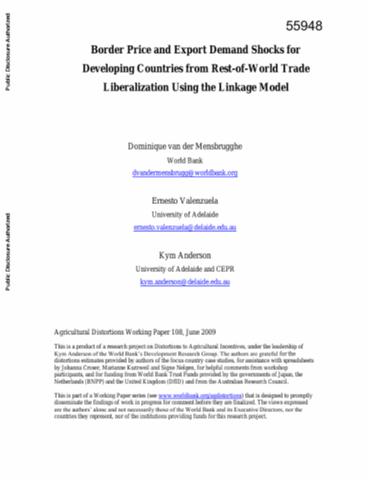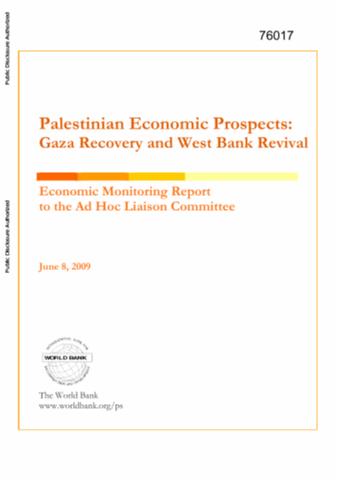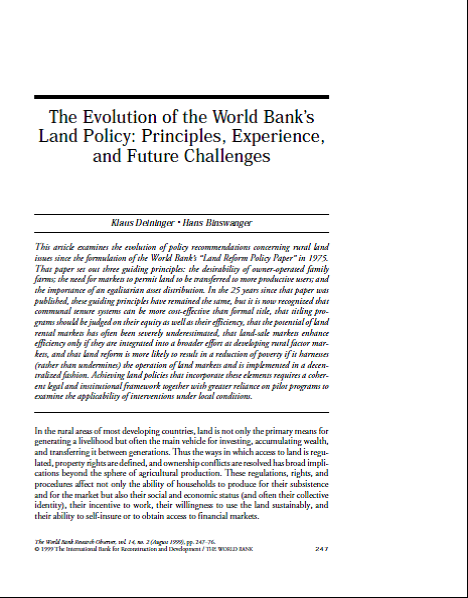The World Bank is a vital source of financial and technical assistance to developing countries around the world. We are not a bank in the ordinary sense but a unique partnership to reduce poverty and support development. The World Bank Group has two ambitious goals: End extreme poverty within a generation and boost shared prosperity.
- To end extreme poverty, the Bank's goal is to decrease the percentage of people living on less than $1.25 a day to no more than 3% by 2030.
- To promote shared prosperity, the goal is to promote income growth of the bottom 40% of the population in each country.
The World Bank Group comprises five institutions managed by their member countries.
The World Bank Group and Land: Working to protect the rights of existing land users and to help secure benefits for smallholder farmers
The World Bank (IBRD and IDA) interacts primarily with governments to increase agricultural productivity, strengthen land tenure policies and improve land governance. More than 90% of the World Bank’s agriculture portfolio focuses on the productivity and access to markets by small holder farmers. Ten percent of our projects focus on the governance of land tenure.
Similarly, investments by the International Finance Corporation (IFC), the World Bank Group’s private sector arm, including those in larger scale enterprises, overwhelmingly support smallholder farmers through improved access to finance, inputs and markets, and as direct suppliers. IFC invests in environmentally and socially sustainable private enterprises in all parts of the value chain (inputs such as irrigation and fertilizers, primary production, processing, transport and storage, traders, and risk management facilities including weather/crop insurance, warehouse financing, etc
For more information, visit the World Bank Group and land and food security (https://www.worldbank.org/en/topic/agriculture/brief/land-and-food-security1
Resources
Displaying 4721 - 4725 of 4907Border Price and Export Demand Shocks for Developing Countries from Rest-of-World Trade Liberalization Using the Linkage Model
The volume on agricultural price distortions, inequality and poverty begins with a global study that uses the World Bank's linkage model to examine the economic impacts in various countries, regions and the world as a whole of agricultural and trade policies as of 2004. It does so by shocking that model with the removal of all agricultural price-distorting domestic and border policies with, and without, the removal of trade policies affecting all other goods.
Agricultural Protection and Poverty in Indonesia
A general equilibrium modeling approach is used to estimate the effects within Indonesia of unilateral and global trade liberalization, including effects on poverty incidence. It is concluded that global reform of trade policy in all commodities is a significant potential source of poverty reduction for Indonesia. The poor rural and urban have a strong interest in global trade policy reform. If Indonesia were to liberalize unilaterally, poverty incidence also will decline but the effect is small.
The Poverty Impacts of Global Commodity Trade Liberalization
This paper examines the poverty impacts of global merchandise trade reform by looking at a wide range of developing countries in Africa, Asia and Latin America. Overall, the authors find that trade reform tends to reduce poverty primarily through the inclusion of agricultural components. The majority of developing country sample experiences small poverty increases from non-agricultural reforms.
Palestinian Economic Prospects
In its report to the September 22, 2008 meeting of the Ad Hoc Liaison Committee (AHLC), the World Bank noted that the Palestinian Authority (PA), Israel, and the international donor community made some progress on the three parallel conditions for Palestinian economic revival, albeit to different degrees. The report notes the dramatic impact of Israel s recent three-week offensive in Gaza and analyzes the variety of recovery and reconstruction schemes being explored by the donor community.
The Evolution of the World Bank’s Land Policy: Principles, Experience, and Future Challenges
This article examines the evolution of policy recommendations concerning rural land issues since the formulation of the World Bank’s “Land Reform Policy Paper” in 1975. That paper set out three guiding principles: the desirability of owner-operated family farms; the need for markets to permit land to be transferred to more productive users; and the importance of an egalitarian asset distribution.










